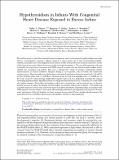| dc.contributor.author | Thaker, Vidhu V. | en_US |
| dc.contributor.author | Galler, Marjorie F. | en_US |
| dc.contributor.author | Marshall, Audrey C. | en_US |
| dc.contributor.author | Almodovar, Melvin C. | en_US |
| dc.contributor.author | Hsu, Ho-Wen | en_US |
| dc.contributor.author | Addis, Christopher J. | en_US |
| dc.contributor.author | Feldman, Henry A. | en_US |
| dc.contributor.author | Brown, Rosalind S. | en_US |
| dc.contributor.author | Levine, Bat-Sheva | en_US |
| dc.date.accessioned | 2018-01-18T02:29:12Z | |
| dc.date.issued | 2017 | en_US |
| dc.identifier.citation | Thaker, Vidhu V., Marjorie F. Galler, Audrey C. Marshall, Melvin C. Almodovar, Ho-Wen Hsu, Christopher J. Addis, Henry A. Feldman, Rosalind S. Brown, and Bat-Sheva Levine. 2017. “Hypothyroidism in Infants With Congenital Heart Disease Exposed to Excess Iodine.” Journal of the Endocrine Society 1 (8): 1067-1078. doi:10.1210/js.2017-00174. http://dx.doi.org/10.1210/js.2017-00174. | en |
| dc.identifier.issn | | en |
| dc.identifier.uri | http://nrs.harvard.edu/urn-3:HUL.InstRepos:34651935 | |
| dc.description.abstract | Thyroid hormone is critical for neonatal brain development, and even transient hypothyroidism can cause adverse neurocognitive outcomes. Infants exposed to excess iodine are at risk of developing hypothyroidism, especially those with congenital heart disease (CHD), because they are routinely exposed to excess iodine from intravenous iodinated contrast media and topical antiseptics. The aim of the present study was to identify the proportion of neonates with CHD exposed to iodine who developed hypothyroidism and to identify the associated risk factors. This was a retrospective study of neonates undergoing cardiac catheterization at Boston Children’s Hospital during a 3-year period, some of whom also underwent cardiac surgery. Hypothyroidism was defined as an elevated thyroid-stimulating hormone level (>20 mIU/L at 24 to 96 hours of age and >15 mIU/L at >96 hours of age by heel-stick sampling and >9.1 mIU/L at 1 to 20 weeks of age by serum testing). Multivariate logistic regression was performed to predict the odds of developing hypothyroidism. Hypothyroidism was diagnosed incidentally in 46 of 183 infants (25%) with CHD after iodine exposure. Controlling for baseline cardiac risk, postnatal age, and gestational age, we found a fourfold increase in odds of developing hypothyroidism in neonates with serum creatinine >0.9 mg/dL and a fourfold increase in those who underwent more than three procedures. Hypothyroidism in neonates with CHD exposed to excess iodine is associated with multiple procedures and impaired renal function. Routine serial monitoring of thyroid function in these neonates is warranted. Future studies should examine the association between hypothyroidism and neurocognitive function in this population. | en |
| dc.language.iso | en_US | en |
| dc.publisher | Endocrine Society | en |
| dc.relation.isversionof | doi:10.1210/js.2017-00174 | en |
| dc.relation.hasversion | http://www.ncbi.nlm.nih.gov/pmc/articles/PMC5686596/pdf/ | en |
| dash.license | LAA | en_US |
| dc.subject | Thyroid | en |
| dc.subject | hypothyroidism | en |
| dc.subject | congenital heart disease | en |
| dc.subject | iodine | en |
| dc.subject | cardiac catheterization | en |
| dc.title | Hypothyroidism in Infants With Congenital Heart Disease Exposed to Excess Iodine | en |
| dc.type | Journal Article | en_US |
| dc.description.version | Version of Record | en |
| dc.relation.journal | Journal of the Endocrine Society | en |
| dash.depositing.author | Thaker, Vidhu V. | en_US |
| dc.date.available | 2018-01-18T02:29:12Z | |
| dc.identifier.doi | 10.1210/js.2017-00174 | * |
| dash.contributor.affiliated | Levine, Bat-Sheva | |
| dash.contributor.affiliated | Brown, Rosalind | |
| dash.contributor.affiliated | Thaker, Vidhu V. | |
| dash.contributor.affiliated | Feldman, Henry | |


